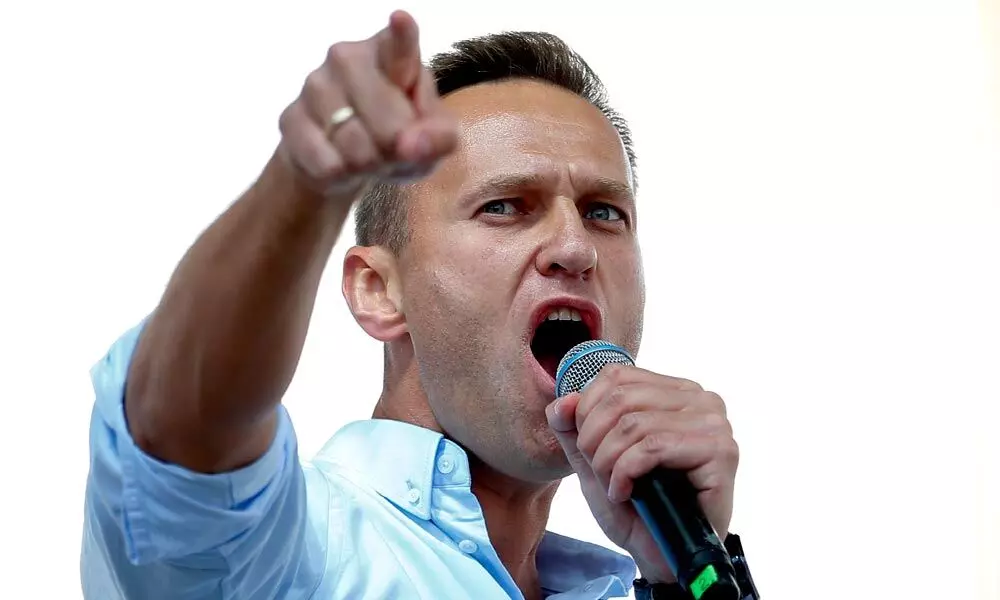Russia needs democracy campaigners in these dark times
Poor judgment on some matters doesn’t make Navalny imprisonment any less unjust
image for illustrative purpose

The organisation defines prisoners of conscience as those who do not advocate or condone violence or hatred, but are imprisoned for who they are or what they believe
HUMAN rights group Amnesty International has revoked Alexey Navalny's prisoner of conscience status because of past xenophobic comments. The jailed Russian opposition leader's anti-migrant statements and nationalist dalliances are well-known. He has never retracted those views. Yet history books are full of imperfect crusaders - proof we can't always choose a model citizen to galvanize others in the battle for political liberties and against corruption.
This does not mean Western supporters, much less Russian citizens, should accept racism as a price to pay, or the means to an end. Offensive statements on people from the Caucasus and Central Asia, even made several years ago, require scrutiny. But is that the prime concern today? And how realistic is it to hold jailed political activists in the world's most difficult corners to the highest Western standards?
Criticizing President Vladimir Putin never made a saint of the Kremlin's loudest detractor, or even a clear-cut liberal, for all his charisma and courage. He is unusual less for how inconsistent his views are, than for how publicly many of his positions have evolved. Poor judgment on some matters doesn't make his imprisonment any less unjust.
The reality is that support for Russian democracy campaigners is sorely needed at one of the country's darkest times in recent memory. Western champions, governments and other observers would do well to focus less on the individual - tempting as that may be, especially when opposing a highly personalized regime - and more on the wider movement by backing civil society writ large. That would have the benefit of avoiding falling into the trap of lionizing deeply flawed figures, as has happened in the past.
The episode has been an uncomfortable muddle for Amnesty. The group initially referred to Navalny as a prisoner of conscience after his arrest last month, and then had second thoughts after concerns were raised over whether past comments qualified as advocating hatred. By backtracking, it has inadvertently fed a Kremlin smear campaign that seeks to cast Navalny, first and foremost, as a racist, an enemy of Russia, even a Nazi, emphasizing his attendance several years ago at a nationalist march of anti-immigration, far-right activists. One prominent pro-Kremlin television anchor earlier this month went so far as to liken him to Adolf Hitler, only less brave. Amnesty says it will continue to campaign for Navalny's release. It denies being influenced by an orchestrated propaganda campaign, though it acknowledges old comments have resurfaced more frequently of late. "As a matter of principle, we cannot ignore the evidence before us," the group said in a statement. It's not the first time the group has tangled itself in its own orthodoxy. The organisation defines prisoners of conscience as those who do not advocate or condone violence or hatred, but are imprisoned for who they are or what they believe. In 1964, it revoked Nelson Mandela's status when he was found to support violent opposition to South Africa's pro-apartheid regime.
Myanmar's Aung San Suu Kyi, by contrast, became one of the most famous such prisoners of conscience during her house arrest. Yet once in power, she failed to stand up for free speech and actively defended the military against accusations of genocide in Rakhine State. Amnesty, which had made her an ambassador of conscience, withdrew that honor.
Where Navalny is concerned, there's no getting around the unpleasantness of the views expressed years ago and never disavowed, even against a background where such sentiments are not uncommon: A Levada Center survey last year found 73 per cent of Russians wanted to limit the influx of labor migrants. His views are those of a politician learning on the go, who does not fit into a Western box. He is less a liberal in the mold of figures like Grigory Yavlinsky - who rose to prominence as a reformer in the last days of the Soviet Union, has been a fierce critic of both Putin and Navalny and resists compromise - than he is a populist, willing to bend to create broad coalitions.
It's possible to object both to his imprisonment and to his xenophobia. It's just that for now, as Ben Noble, a lecturer in Russian politics at the University College London pointed out to me, the former is more pressing: With any prospect of Navalny coming to power very distant, concern should focus on getting Russia closer to the point where voters can freely choose their own leader.
The debate over what is tolerable in particular contexts, and what is not, raises questions relevant beyond Amnesty's headquarters. Supporters of opposition movements in authoritarian states regularly face conundrums over lesser evils.
So far, Navalny has proven his courage, and an appeal that poses a real threat to the Kremlin. He can mobilize frustrated Russians in the most trying of circumstances. Still, those demonstrating after his arrest were largely anti-government protesters, not pro-Navalny campaigners, and his overall support levels among an indifferent electorate remain weak. He's a compelling figure, but far more is at stake.
Amnesty is rightly principled. Unfortunately, this diversion has served only the Kremlin's purpose. (Bloomberg)

